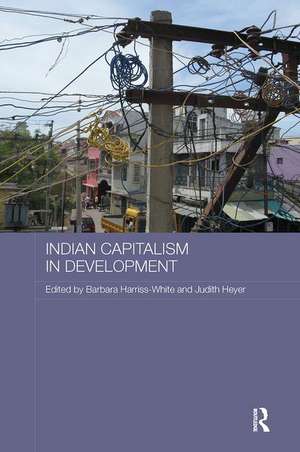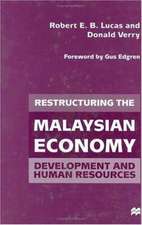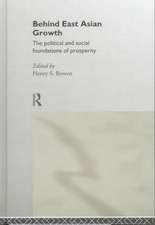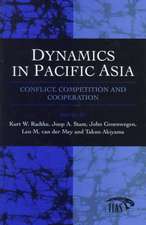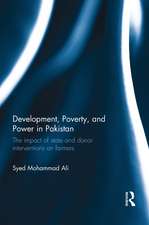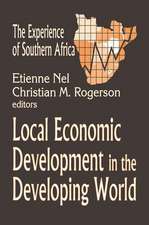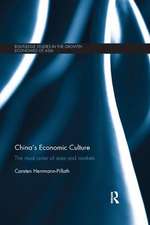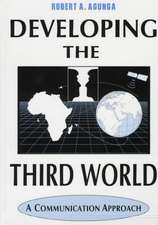Indian Capitalism in Development: Routledge Contemporary South Asia Series
Editat de Barbara Harriss-White, Judith Heyeren Limba Engleză Paperback – 24 ian 2018
With its focus on India, the book demonstrates the continuing relevance of the comparative political economy of development for the analysis of contemporary capitalism. Beginning with an exploration of capitalism in agriculture and rural development, it goes on to discuss rural labour, small town entrepreneurs, and technical change and competition in rural and urban manufacturing, highlighting the relationships between agricultural and non-agricultural firms and employment. An analysis of processes of commodification and their interaction with uncommodified areas of the economy makes use of the ‘knowledge economy’ as a case study. Other chapters look at the political economy of energy as a driver of accumulation in contradiction with both capital and labour, and at how the political economy of policy processes regulating energy highlights the fragmentary nature of the Indian state. Finally, a chapter on the processes and agencies involved in the export of wealth argues that this plays a crucial role in concealing the exploitation of labour in India.
Bringing together scholars who have engaged with classical political economy to advance the understanding of contemporary capitalism in South Asia, and distinctive in its use of an interdisciplinary political economy approach, the book will be of interest to students and scholars of South Asian Politics, Political Economy and Development Studies.
| Toate formatele și edițiile | Preț | Express |
|---|---|---|
| Paperback (1) | 325.34 lei 6-8 săpt. | |
| Taylor & Francis – 24 ian 2018 | 325.34 lei 6-8 săpt. | |
| Hardback (1) | 1057.09 lei 6-8 săpt. | |
| Taylor & Francis – 20 oct 2014 | 1057.09 lei 6-8 săpt. |
Din seria Routledge Contemporary South Asia Series
-
 Preț: 393.90 lei
Preț: 393.90 lei -
 Preț: 310.08 lei
Preț: 310.08 lei - 8%
 Preț: 389.83 lei
Preț: 389.83 lei -
 Preț: 296.64 lei
Preț: 296.64 lei -
 Preț: 316.71 lei
Preț: 316.71 lei -
 Preț: 313.81 lei
Preț: 313.81 lei -
 Preț: 349.02 lei
Preț: 349.02 lei - 9%
 Preț: 1035.76 lei
Preț: 1035.76 lei - 18%
 Preț: 1056.00 lei
Preț: 1056.00 lei - 26%
 Preț: 848.40 lei
Preț: 848.40 lei - 18%
 Preț: 1059.48 lei
Preț: 1059.48 lei - 18%
 Preț: 1068.52 lei
Preț: 1068.52 lei - 18%
 Preț: 1060.87 lei
Preț: 1060.87 lei - 18%
 Preț: 1057.26 lei
Preț: 1057.26 lei - 18%
 Preț: 1057.75 lei
Preț: 1057.75 lei - 18%
 Preț: 1061.93 lei
Preț: 1061.93 lei - 18%
 Preț: 1057.05 lei
Preț: 1057.05 lei - 18%
 Preț: 1062.98 lei
Preț: 1062.98 lei - 18%
 Preț: 1049.21 lei
Preț: 1049.21 lei - 18%
 Preț: 1058.79 lei
Preț: 1058.79 lei - 18%
 Preț: 1057.09 lei
Preț: 1057.09 lei - 18%
 Preț: 705.87 lei
Preț: 705.87 lei - 18%
 Preț: 1054.97 lei
Preț: 1054.97 lei - 18%
 Preț: 1109.42 lei
Preț: 1109.42 lei - 25%
 Preț: 823.63 lei
Preț: 823.63 lei - 18%
 Preț: 1169.78 lei
Preț: 1169.78 lei - 26%
 Preț: 846.42 lei
Preț: 846.42 lei - 18%
 Preț: 1054.71 lei
Preț: 1054.71 lei - 18%
 Preț: 1057.75 lei
Preț: 1057.75 lei - 18%
 Preț: 1062.98 lei
Preț: 1062.98 lei - 26%
 Preț: 822.36 lei
Preț: 822.36 lei - 26%
 Preț: 848.15 lei
Preț: 848.15 lei - 18%
 Preț: 1053.92 lei
Preț: 1053.92 lei - 18%
 Preț: 698.58 lei
Preț: 698.58 lei - 18%
 Preț: 1058.79 lei
Preț: 1058.79 lei - 18%
 Preț: 1062.98 lei
Preț: 1062.98 lei - 18%
 Preț: 1057.75 lei
Preț: 1057.75 lei - 18%
 Preț: 1060.87 lei
Preț: 1060.87 lei - 18%
 Preț: 1057.40 lei
Preț: 1057.40 lei - 18%
 Preț: 1056.56 lei
Preț: 1056.56 lei - 18%
 Preț: 1169.45 lei
Preț: 1169.45 lei - 25%
 Preț: 823.63 lei
Preț: 823.63 lei - 18%
 Preț: 1059.48 lei
Preț: 1059.48 lei -
 Preț: 378.09 lei
Preț: 378.09 lei - 18%
 Preț: 1055.51 lei
Preț: 1055.51 lei - 18%
 Preț: 1057.75 lei
Preț: 1057.75 lei - 18%
 Preț: 1227.38 lei
Preț: 1227.38 lei - 26%
 Preț: 850.37 lei
Preț: 850.37 lei - 18%
 Preț: 1166.01 lei
Preț: 1166.01 lei
Preț: 325.34 lei
Preț vechi: 371.71 lei
-12% Nou
Puncte Express: 488
Preț estimativ în valută:
62.25€ • 65.16$ • 51.81£
62.25€ • 65.16$ • 51.81£
Carte tipărită la comandă
Livrare economică 31 martie-14 aprilie
Preluare comenzi: 021 569.72.76
Specificații
ISBN-13: 9781138491519
ISBN-10: 1138491519
Pagini: 282
Ilustrații: 2
Dimensiuni: 156 x 234 mm
Greutate: 0.45 kg
Ediția:1
Editura: Taylor & Francis
Colecția Routledge
Seria Routledge Contemporary South Asia Series
Locul publicării:Oxford, United Kingdom
ISBN-10: 1138491519
Pagini: 282
Ilustrații: 2
Dimensiuni: 156 x 234 mm
Greutate: 0.45 kg
Ediția:1
Editura: Taylor & Francis
Colecția Routledge
Seria Routledge Contemporary South Asia Series
Locul publicării:Oxford, United Kingdom
Public țintă
PostgraduateCuprins
- Introduction
- Primitive Accumulation and Capitalist Development in Neoliberal India: Mechanisms, Resistance, and Persistence of Self-Employed Labour
- Regional Patterns of Agrarian Accumulation in India
- Agrarian Relations and Institutional Diversity in Arunachal Pradesh
- First Transaction, Multiple Dimensions: The Changing Terms of Commodity Exchange in a Regulated Market in Madhya Pradesh
- The Political Economy of Microfinance and Marginalised Groups: Implications of Alternative Institutional Strategies
- Labour in Contemporary South India
- Emerging Spatio-Technical Regimes of Accumulation in the Globalising South and Implications for Labour
- Commodification, Capitalism and Crisis
- A Heterodox Analysis of Capitalism: Insights from a Market Town in South India after the Green Revolution
- Money Laundering and Capital Flight
- Power Hungry: The State and the Troubled Transition in Indian Electricity
- Technology and Materiality: South Asia in the 21st Century
Notă biografică
Barbara Harriss-White was formerly Director of Oxford University’s Contemporary South Asian Studies programme, and Director of the Department of International Development at Queen Elizabeth House. She is now Emeritus Professor of Development Studies and Senior Research Fellow in Area Studies, Oxford University, UK. Since 1969 she has been studying and teaching Indian political economy focussing on rural development, informal capitalism and many aspects of deprivation.
Judith Heyer was formerly a Tutorial Fellow of Somerville College, and Lecturer in the Department of Economics, at Oxford University. She is now an Emeritus Fellow of Somerville College. She has written extensively on Kenya and India, specialising in rural development and political economy.
Judith Heyer was formerly a Tutorial Fellow of Somerville College, and Lecturer in the Department of Economics, at Oxford University. She is now an Emeritus Fellow of Somerville College. She has written extensively on Kenya and India, specialising in rural development and political economy.
Recenzii
"This excellent collection by leading South Asian and European scholars could not be more timely. Their essays, grounded in field work and with analytical finesse, make notable contributions to our understanding of the complexities and contradictions of capitalist development across India’s s major economic sectors today. The authors provide new insights on longstanding issues in the light of current change in India, as well as addressing new topics like India’s much vaunted ‘knowledge economy’, money laundering and capital flight."
Henry Bernstein
"Is Indian capitalism really different? This important book addresses this question through a focus on patterns of accumulation and how they interact with other economic, social, political and cultural processes, providing fascinating insights into the singularities, diversities and complexities of capitalism – and economy and society in general – in India."
Jayati Ghosh
"The set of papers in this volume traces the dynamics of capitalist development in India focusing on activities where the mass of the labour force is concentrated and subjected to manifold exploitation."
K.P.Kannan
Henry Bernstein
"Is Indian capitalism really different? This important book addresses this question through a focus on patterns of accumulation and how they interact with other economic, social, political and cultural processes, providing fascinating insights into the singularities, diversities and complexities of capitalism – and economy and society in general – in India."
Jayati Ghosh
"The set of papers in this volume traces the dynamics of capitalist development in India focusing on activities where the mass of the labour force is concentrated and subjected to manifold exploitation."
K.P.Kannan
Descriere
Recognising the different ways that capitalism is theorised, this book explores various aspects of contemporary capitalism in India. It raises questions about the varieties and levels of capitalism, and about the different roles played by the state. Using field research at a local level to engage with larger issues, the book presents a comprehensive analysis of 21st century Indian capitalism. It is distinctive in its use of an interdisciplinary political economy approach and brings together scholars who have engaged with classical political economy to advance the understanding of contemporary capitalism in South Asia.
